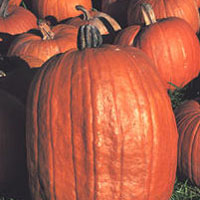Gluten Free
What does following a gluten-free diet mean? That you're embarking on an easy diet with a wide range of health-promoting effects. Instead of dwelling on what you’re giving up, consider that you’re going to enjoy a whole new world of delicious food options to meet your special dietary needs. You’ll be eating seasonally, choosing more fresh fruits and vegetables, focusing on meats, seafood, poultry, legumes, lentils, corn, and rice, and discovering fascinating ancient grains such as quinoa, amaranth, and millet. You’ll be able to eat potatoes, eggs, most cheeses, even chocolate (!)—and enjoy them without guilt because you’ll be taking good care of your body. In fact, you’ll probably end up eating—and feeling—better than ever!
Visit this page for more information about living Gluten Free
---
We carry a large variety of gluten free items, the brands listed below represent just some of the offerings we carry















More Diets
Pumpkin
 © Martin Wall
© Martin WallHow It Works
Pumpkin seeds contain several major groups of active constituents: essential fatty acids, amino acids, phytosterols (e.g. beta-sitosterol) minerals, and vitamins. Other major constituents include mucilaginous carbohydrates and minerals.
Pumpkin seed oil has been used in combination with saw palmetto in two double-blind trials to effectively reduce symptoms of benign prostatic hyperplasia (BPH).4, 5 Only one open label trial evaluated the effectiveness of pumpkin seed oil alone for BPH.6 Animal studies have shown that pumpkin seed extracts can improve the function of the bladder and urethra. This might partially account for BPH symptom relief.7
Curcurbitin is a constituent in pumpkin seeds that has shown anti-parasitic activity in the test tube.8 Human trials conducted in China have shown pumpkin seeds to be helpful for people with acute schistosomiasis, a severe parasitic disease occurring primarily in Asia and Africa that is transmitted through snails.9 Preliminary human research conducted in China and Russia has shown pumpkin seeds may also help resolve tapeworm infestations.10, 11 The assistance of a physician is required to help diagnose and treat any suspected intestinal parasite infections.
Two trials in Thailand have reportedly found that eating pumpkin seeds as a snack can help prevent the most common type of kidney stone.12, 13 Pumpkin seeds appear to both reduce levels of substances that promote stone formation in the urine and increase levels of substances that inhibit stone formation. The active constituents of pumpkin seeds responsible for this action have not been identified.
How to Use It
Pumpkin seed oil extracts standardized for fatty acid content have been used in BPH trials. Men with BPH have used 160 mg three times per day with meals.14 Approximately 5–10 grams per day of pumpkin seeds may be needed for kidney stone prevention.15 As a treatment for parasites, 200–400 grams are ground and taken with milk and honey, followed by castor oil two hours later. This treatment, however, should not be attempted unless under medical supervision.
Copyright © 2025 TraceGains, Inc. All rights reserved.
Learn more about TraceGains, the company.
The information presented by TraceGains is for informational purposes only. It is based on scientific studies (human, animal, or in vitro), clinical experience, or traditional usage as cited in each article. The results reported may not necessarily occur in all individuals. Self-treatment is not recommended for life-threatening conditions that require medical treatment under a doctor's care. For many of the conditions discussed, treatment with prescription or over the counter medication is also available. Consult your doctor, practitioner, and/or pharmacist for any health problem and before using any supplements or before making any changes in prescribed medications. Information expires December 2025.











